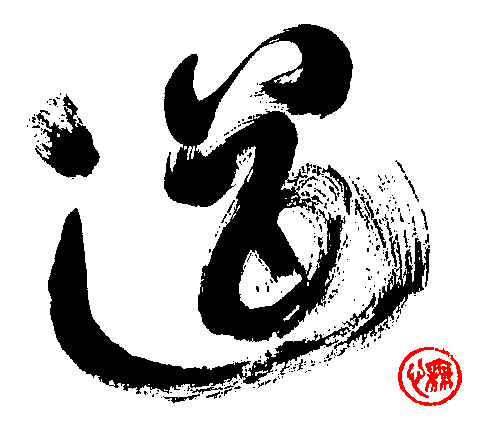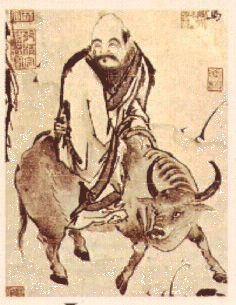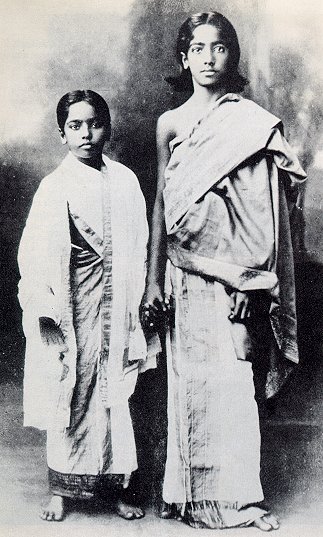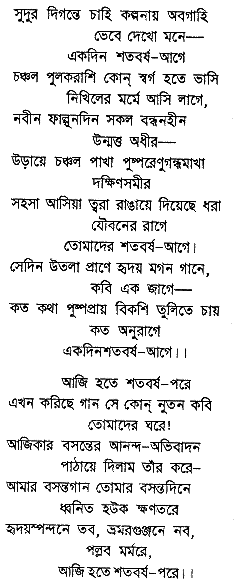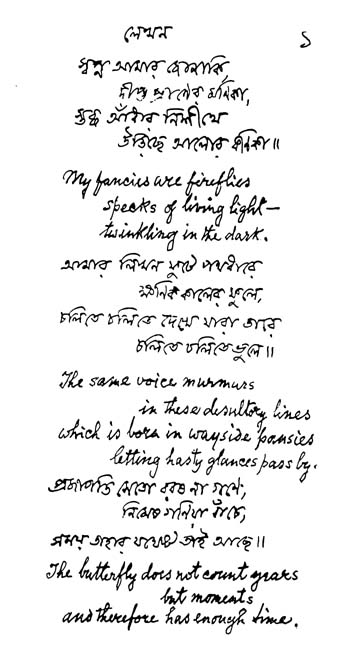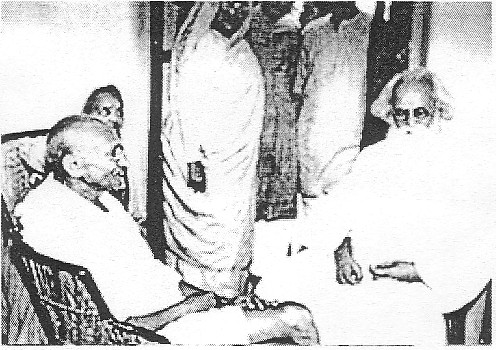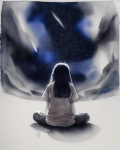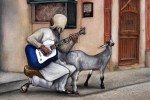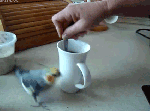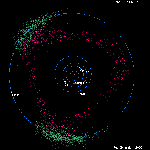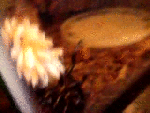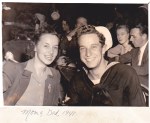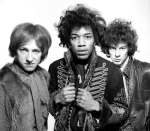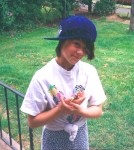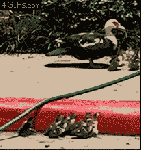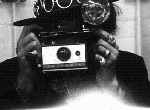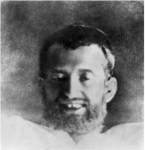Scroll down a ways for Part 1.
Max Muller Translation, mostly. I just finished cleaning up the text tonight- eliminating some verbose debris, removing the original page numbers and fixing weird paragraph splits. This is a 19th century translation and they tend to run on and on. The upside is that it is public domain.
This is it (the full 262 pages): UpanishadsPt2MaxMuller

Excerpt from Part 2, complete with Muller’s notes:
BRIHADARANYAKA-UPANISHAD
FIRST ADHYAYA [*1].
FIRST BRAHMANA.
1. Verily [*2] the dawn is the head of the horse which is fit for sacrifice, the sun its eye, the wind its breath, the mouth the Vaisvanara [*3] fire, the year the body of the sacrificial horse. Heaven is the back, the sky the belly, the earth the chest [*4], the quarters the two sides, the intermediate quarters the ribs, the members the seasons, the joints the months and half-months, the feet days and nights, the bones the stars, the flesh the clouds. The half-digested food is the sand, the rivers the bowels [*1], the liver and the lungs [*2] the mountains, the hairs the herbs and trees. As the sun rises, it is the forepart, as it sets, the hindpart of the horse. When the horse shakes itself [*3], then it lightens; when it kicks, it thunders; when it makes water, it rains; voice [*4] is its voice.
2. Verily Day arose after the horse as the (golden) vessel [*5], called Mahiman (greatness), which (at the sacrifice) is placed before the horse. Its place is in the Eastern sea. The Night arose after the horse as the (silver) vessel, called Mahiman, which (at the sacrifice) is placed behind the horse. Its place is in the Western sea. Verily, these two vessels (or greatnesses) arose to be on each side of the horse.
As a racer he carried the Devas, as a stallion the Gandharvas, as a runner the Asuras, as a horse men. The sea is its kin, the sea is its birthplace.
Footnotes
^73:1 It is the third Adhyaya of the Aranyaka, but the first of the Upanishad.
^73:2 This Brahmana is found in the Madhyandina text of the Satapatha, ed. Weber, X, 6, 4. Its object is there explained by the commentary to be the meditative worship of Virag, as represented metaphorically in the members of the horse. Sayana dispenses with its explanation, because, as part of the Brihadaranyaka-upanishad, according to the Kanva-sakha, it had been enlarged on by the Varttikakara and explained.
^73:3 Agni or fire, as pervading everything, as universally present in nature.
^73:4 Pagasya is doubtful. The commentator suggests pad-asya, the place of the feet, i.e. the hoof The Greek Pegasos, or ippoi peloi, throws no light on the word. The meaning of hoof would hardly be appropriate here, and I prefer chest on account of uras in I, 2, 3. Deussen (Vedanta, p. 8) translates, die Erde seiner Fusse Schemel; but we want some part of the horse.
^74:1 Guda, being in the plural, is explained by nadi, channel, and sirah; for we ought to read sira or hiragrahane for sira, p. 22, l. 16.
^74:2 Klomanah is explained as a plurale tantum (nityam bahuvakanam ekasmin), and being described as a lump below the heart, on the opposite side of the liver, it is supposed to be the lungs.
^74:3 ‘When it yawns.’ Anandagiri.
^74:4 Voice is sometimes used as a personified power of thunder and other aerial sounds, and this is identified with the voice of the horse.
^74:5 Two vessels, to hold the sacrificial libations, are placed at the Asvamedha before and behind the horse, the former made of gold, the latter made of silver. They are called Mahiman in the technical language of the ceremonial. The place in which these vessels are set, is called their yoni. Cf. Vagas. Samhita XXIII, 2.
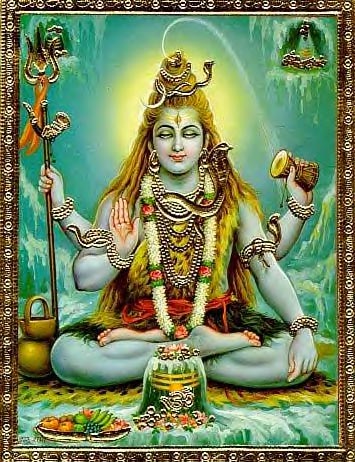
SECOND BRAHMANA [*6].
1. In the beginning there was nothing (to be perceived) here whatsoever. By Death indeed all this was concealed,–by hunger; for death is hunger. Death (the first being) thought, ‘Let me have a body.’ Then he moved about, worshipping. From him thus worshipping water was produced. And he said: ‘Verily, there appeared to me, while I worshipped (arkate), water (ka).’ This is why water is called ar-ka [*1]. Surely there is water (or pleasure) for him who thus knows the reason why water is called arka.
2. Verily water is arka. And what was there as the froth of the water, that was hardened, and became the earth. On that earth he (Death) rested, and from him, thus resting and heated, Agni (Virag) proceeded, full of light.
3. That being divided itself threefold, Aditya (the sun) as the third, and Vayu (the air) as the third [*2]. That spirit (prana) [*3] became threefold. The head was the Eastern quarter, and the arms this and that quarter (i. e. the N. E. and S. E., on the left and right sides). Then the tail was the Western quarter, and the two legs this and that quarter (i. e. the N. W. and S. W.) The sides were the Southern and Northern quarters, the back heaven, the belly the sky, the dust the earth. Thus he (Mrityu, as arka) stands firm in the water, and he who knows this stands firm wherever he goes.
4. He desired [*1], ‘Let a second body be born of me,’ and he (Death or Hunger) embraced Speech in his mind. Then the seed became the year. Before that time there was no year. Speech [*2] bore him so long as a year, and after that time sent him forth. Then when he was born, he (Death) opened his mouth, as if to swallow him. He cried Bhan! and that became speech [*3].
5. He thought, ‘If I kill him, I shall have but little food.’ He therefore brought forth by that speech and by that body (the year) all whatsoever exists, the Rik, the Yagus, the Saman, the metres, the sacrifices, men, and animals.
And whatever he (Death) brought forth, that he resolved to eat (ad). Verily because he eats everything, therefore is Aditi (Death) called Aditi. He who thus knows why Aditi is called Aditi, becomes an eater of everything, and everything becomes his food [*4].
6. He desired to sacrifice again with a greater sacrifice. He toiled and performed penance. And while he toiled and performed penance, glorious power [*1] went out of him. Verily glorious power means the senses (prana). Then when the senses had gone out, the body took to swelling (sva-yitum), and mind was in the body.
7. He desired that this body should be fit for sacrifice (medhya), and that he should be embodied by it. Then he became a horse (asva), because it swelled (asvat), and was fit for sacrifice (medhya); and this is why the horse-sacrifice is called Asva-medha.
Verily he who knows him thus, knows the Asvamedha. Then, letting the horse free, he thought [*2], and at the end of a year he offered it up for himself, while he gave up the (other) animals to the deities. Therefore the sacrificers offered up the purified horse belonging to Pragapati, (as dedicated) to all the deities.
Verily the shining sun is the Asvamedha-sacrifice, and his body is the year; Agni is the sacrificial fire (arka), and these worlds are his bodies. These two are the sacrificial fire and the Asvamedha-sacrifice, and they are again one deity, viz. Death. He (who knows this) overcomes another death, death does not reach him, death is his Self, he becomes one of those deities.

THIRD BRAHMANA [*1].
1. There were two kinds of descendants of Pragapati, the Devas and the Asuras [*2]. Now the Devas were indeed the younger, the Asuras the elder ones [*3]. The Devas, who were struggling in these worlds, said: ‘Well, let us overcome the Asuras at the sacrifices (the Gyotishtoma) by means of the udgitha.’
2. They said to speech (Vak): ‘Do thou sing out for us (the udgitha).’ ‘Yes,’ said speech, and sang (the udgitha). Whatever delight there is in speech, that she obtained for the Devas by singing (the three pavamanas); but that she pronounced well (in the other nine pavamanas), that was for herself. The Asuras knew: ‘Verily, through this singer they will overcome us.’ They therefore rushed at the singer and pierced her with evil. That evil which consists in saying what is bad, that is that evil.
3. Then they (the Devas) said to breath (scent): ‘Do thou sing out for us.’ ‘Yes,’ said breath, and sang. Whatever delight there is in breath (smell), that he obtained for the Devas by singing; but that he smelled well, that was for himself. The Asuras knew: ‘Verily, through this singer they will overcome us.’ They therefore rushed at the singer, and pierced him with evil. That evil which consists in smelling what is bad, that is that evil.
4. Then they said to the eye: ‘Do thou sing out for us.’ ‘Yes,’ said the eye, and sang. Whatever delight there is in the eye, that he obtained for the Devas by singing; but that he saw well, that was for himself The Asuras knew: ‘Verily, through this singer they will overcome us.’ They therefore rushed at the singer, and pierced him with evil. That evil which consists in seeing what is bad, that is that evil.
5. Then they said to the ear: ‘Do thou sing out for us.’ ‘Yes,’ said the ear, and sang. Whatever delight there is in the ear, that he obtained for the Devas by singing; but that he heard well, that was for himself. The Asuras knew: ‘Verily, through this singer they will overcome us.’ They therefore rushed at the singer, and pierced him with evil. That evil which consists in hearing what is bad, that is that evil.
6. Then they said to the mind: ‘Do thou sing out for us.’ ‘Yes,’ said the mind, and sang. Whatever delight there is in the mind, that he obtained for the Devas by singing; but that he thought well, that was for himself. The Asuras knew: ‘Verily, through this singer they will overcome us.’ They therefore rushed at the singer, and pierced him with evil. That evil which consists in thinking what is bad, that is that evil.
Thus they overwhelmed these deities with evils, thus they pierced them with evil.
7. Then they said to the breath in the mouth [*1]: ‘Do thou sing for us.’ ‘Yes,’ said the breath, and sang. The Asuras knew: ‘Verily, through this singer they will overcome us.’ They therefore rushed at him and pierced him with evil. Now as a ball of earth will be scattered when hitting a stone, thus they perished, scattered in all directions. Hence the Devas rose, the Asuras fell. He who knows this, rises by his self, and the enemy who hates him falls.
8. Then they (the Devas) said: ‘Where was he then who thus stuck to us [*1]?’ It was (the breath) within the mouth (asye ‘ntar [*2]), and therefore called Ayasya; he was the sap (rasa) of the limbs (anga), and therefore called Angirasa.
9. That deity was called Dur, because Death was far (duran) from it. From him who knows this, Death is far off.
10. That deity, after having taken away the evil of those deities, viz. death, sent it to where the end of the quarters of the earth is. There he deposited their sins. Therefore let no one go to a man, let no one go to the end (of the quarters of the earth [*3]), that he may not meet there with evil, with death.
11. That deity, after having taken away the evil of those deities, viz. death, carried them beyond death.
12. He carried speech across first. When speech had become freed from death, it became (what it had been before) Agni (fire). That Agni, after having stepped beyond death, shines.
13. Then he carried breath (scent) across. When breath had become freed from death, it became Vayu (air). That Vayu, after having stepped beyond death, blows.
14. Then he carried the eye across. When the eye had become freed from death, it became Aditya (the sun). That Aditya, after having stepped beyond death, burns.
15. Then he carried the ear across. When the ear had become freed from death, it became the quarters (space). These are our quarters (space), which have stepped beyond death.
16. Then he carried the mind across. When the mind had become freed from death, it became the moon (Kandramas). That moon, after having stepped beyond death, shines. Thus does that deity carry him, who knows this, across death.
17. Then breath (vital), by singing, obtained for himself eatable food. For whatever food is eaten, is eaten by breath alone, and in it breath rests [*1].
The Devas said: ‘Verily, thus far, whatever food there is, thou hast by singing acquired it for thyself. Now therefore give us a share in that food.’ He said: ‘You there, enter into me.’ They said Yes, and entered all into him. Therefore whatever food is eaten by breath, by it the other senses are satisfied.
18. If a man knows this, then his own relations come to him in the same manner; he becomes their supporter, their chief leader, their strong ruler [*2]. And if ever anyone tries to oppose [*3] one who is possessed of such knowledge among his own relatives, then he will not be able to support his own belongings. But he who follows the man who is possessed of such knowledge, and who with his permission wishes to support those whom he has to support, he indeed will be able to support his own belongings.
19. He was called Ayasya Angirasa, for he is the sap (rasa) of the limbs (anga). Verily, breath is the sap of the limbs. Yes, breath is the sap of the limbs. Therefore from whatever limb breath goes away, that limb withers, for breath verily is the sap of the limbs.
20. He (breath) is also Brihaspati, for speech is Brihati (Rig-veda), and he is her lord; therefore he is Brihaspati.
2 1. He (breath) is also Brahmanaspati, for speech is Brahman (Yagur-veda), and he is her lord; therefore he is Brahmanaspati.
He (breath) is also Saman (the Udgitha), for speech is Saman (Sama-veda), and that is both speech (sa) and breath (ama) [*1]. This is why Saman is called Saman.
22. Or because he is equal (sama) to a grub, equal to a gnat, equal to an elephant, equal to these three worlds, nay, equal to this universe, therefore he is Saman. He who thus knows this Saman, obtains union and oneness with Saman.
23. He (breath) is Udgitha [*2]. Breath verily is Ut, for by breath this universe is upheld (uttabdha); and speech is Githa, song. And because he is ut and githa, therefore he (breath) is Udgitha.
24. And thus Brahmadatta Kaikitaneya (the grandson of Kikitana), while taking Soma (ragan), said: ‘May this Soma strike my head off, if Ayasya Angirasa sang another Udgitha than this. He sang it indeed as speech and breath.’
25. He who knows what is the property of this Saman, obtains property. Now verily its property is tone only. Therefore let a priest, who is going to perform the sacrificial work of a Sama-singer, desire that his voice may have a good tone, and let him perform the sacrifice with a voice that is in good tone. Therefore people (who want a priest) for a sacrifice, look out for one who possesses a good voice, as for one who possesses property. He who thus knows what is the property of that Saman, obtains property.
26. He who knows what is the gold of that Saman, obtains gold. Now verily its gold. is tone only. He who thus knows what is the gold of that Saman, obtains gold.
27. He who knows what is the support of that Saman, he is supported. Now verily its support is speech only. For, as supported in speech, that breath is sung as that Saman. Some say the support is in food.
Next follows the Abhyaroha [*1] (the ascension) of the Pavamana verses. Verily the Prastotri begins to sing the Saman, and when he begins, then let him (the sacrificer) recite these (three Yagus-verses):
‘Lead me from the unreal to the real! Lead me from darkness to light! Lead me from death to immortality!’
Now when he says, ‘Lead me from the unreal to the real,’ the unreal is verily death, the real immortality. He therefore says, ‘Lead me from death to immortality, make me immortal.’
When he says, ‘Lead me from darkness to light,’ darkness is verily death, light immortality. He therefore says, ‘Lead me from death to immortality, make me immortal.’
When he says, ‘Lead me from death to immortality,’ there is nothing there, as it were, hidden (obscure, requiring explanation) [*1].
28. Next come the other Stotras with which the priest may obtain food for himself by singing them. Therefore let the sacrificer, while these Stotras are being sung, ask for a boon, whatever desire he may desire. An Udgatri priest who knows this obtains by his singing whatever desire he may desire either for himself or for the sacrificer. This (knowledge) indeed is called the conqueror of the worlds. He who thus knows this Saman [*2], for him there is no fear of his not being admitted to the worlds [*3].
Footnotes
^74:6 Called the Agni-brahmana, and intended to teach the origin of [p. 75] Agni, the fire, which is here used for the Horse-sacrifice. It is found in the Satapatha-brahmana, Madhyandina-sakha X, 6, 5, and there explained as a description of Hiranyagarbha.
^75:1 We ought to read arkasyarkatvam, as in Poley’s edition, or ark-kasyarkkatvam, to make the etymology still clearer. The commentator takes arka in the sense of fire, more especially the sacrificial fire employed at the Horse-sacrifice. It may be so, but the more natural interpretation seems to me to take arka here as water, from which indirectly fire is produced. From water springs the earth; on that earth he (Mrityu or Pragapati) rested, and from him, while resting there, fire (Virag) was produced. That fire assumed three forms, fire, sun, and air, and in that threefold form it is called prana, spirit.
^75:2 As Agni, Vayu, and Aditya.
^75:3 Here Agni (Virag) is taken as representing the fire of the altar at the Horse-sacrifice, which is called Arka. The object of the whole Brahmana was to show the origin and true character of that fire (arka).
^76:1 He is the same as what was before called mrityu, death, who, after becoming self-conscious, produced water, earth, fire, &c. He now wishes for a second body, which is the year, or the annual sacrifice, the year being dependent on the sun (Aditya).
^76:2 The commentator understands the father, instead of Speech, the mother.
^76:3 The interjectional theory.
^76:4 All these are merely fanciful etymologies of asvamedha and arka.
^77:1 Or glory (senses) and power. Comm.
^77:2 He considered himself as the horse. Roer.
^78:1 Called the Udgitha-brahmana. In the Madhyandina-sakha, the Upanishad, which consists of six adhyayas, begins with this Brahmana (cf. Weber’s edition, p. 104 7; Commentary, p. 1109).
^78:2 The Devas and Asuras are explained by the commentator as the senses, inclining either to sacred or to worldly objects, to good or evil.
^78:3 According to the commentator, the Devas were the less numerous and less strong, the Asuras the more numerous and more powerful.
^79:1 This is the chief or vital breath, sometimes called mukhya.
^80:1 Asakta from sang, to embrace; cf. Rig-veda I, 33, 3. Here it corresponds to the German anhanglich.
^80:2 See Deussen, Vedanta, p. 359.
^80:3 To distant people.
^81:1 This is done by the last nine Pavamanas, while the first three were used for obtaining the reward common to all the pranas.
^81:2 Here annada is well explained by anamayavin, and vyadhirahita, free from sickness, strong.
^81:3 Read pratipratih; see Poley, and Weber, p. 1180.
^82:1 Cf. Khand. Up. V, 2, 6.
^82:2 Not used here in the sense of song or hymn, but as an act of worship connected with the Saman. Comm.
^83:1 The ascension is a ceremony by which the performer reaches the gods, or becomes a god. It consists in the recitation of three Yagus, and is here enjoined to take place when the Prastotri priest begins to sing his hymn.
^84:1 See Deussen, Vedanta, p. 86.
^84:2 He knows that he is the Prana, which Prana is the Saman. That Prana cannot be defeated by the Asuras, i.e. by the senses which are addicted to evil; it is pure, and the five senses finding refuge in him, recover there their original nature, fire, &c. The Prana is the Self of all things, also of speech (Rig-yaguh-samodgitha), and of the Saman that has to be sung and well sung. The Prana pervades all creatures, and he who identifies himself with that Prana, obtains the rewards mentioned in the Brahmana. Comm.
^84:3 In connection with lokagit, lokyata is here explained, and may probably have been intended, as worthiness to be admitted to the highest world. Originally lokyata and alokyata meant right and wrong. See also I, 5, 17.
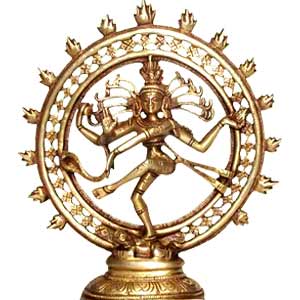
FOURTH BRAHMANA [*1].
1. In the beginning this was Self alone, in the shape of a person (purusha). He looking round saw nothing but his Self. He first said, ‘This is I;’ therefore he became I by name. Therefore even now, if a man is asked, he first says, ‘This is I,’ and then pronounces the other name which he may have. And because before (purva) all this, he (the Self) burnt down (ush) all evils, therefore he was a person (pur-usha). Verily he who knows this, burns down every one who tries to be before him.
2. He feared, and therefore any one who is lonely fears. He thought, ‘As there is nothing but myself, why should I fear?’ Thence his fear passed away. For what should he have feared? Verily fear arises from a second only.
3. But he felt no delight. Therefore a man who is lonely feels no delight. He wished for a second. He was so large as man and wife together. He then made this his Self to fall in two (pat), and thence arose husband (pati) and wife (patni). Therefore Yagnavalkya said: ‘We two [*2] are thus (each of us) like half a shell [*3].’ Therefore the void which was there, is filled by the wife. He embraced her, and men were born.
4. She thought, ‘How can he embrace me, after having produced me from himself? I shall hide myself.’
She then became a cow, the other became a bull and embraced her, and hence cows were born. The one became a mare, the other a stallion; the one a male ass, the other a female ass. He embraced her, and hence one-hoofed animals were born. The one became a she-goat, the other a he-goat; the one became a ewe [*1], the other a ram. He embraced her, and hence goats and sheep were born. And thus he created everything that exists in pairs, down to the ants.
5. He knew, ‘I indeed am this creation, for I created all this.’ Hence he became the creation, and he who knows this lives in this his creation.
6. Next he thus produced fire by rubbing. From the mouth, as from the fire-hole, and from the hands he created fire [*2]. Therefore both the mouth and the hands are inside without hair, for the fire-hole is inside without hair.
And when they say, ‘Sacrifice to this or sacrifice to that god,’ each god is but his manifestation, for he is all gods.
Now, whatever there is moist, that he created from seed; this is Soma. So far verily is this universe either food or eater. Soma indeed is food, Agni eater. This is the highest creation of Brahman, when he created the gods from his better part [*1], and when he, who was (then) mortal [*2], created the immortals. Therefore it was the highest creation. And he who knows this, lives in this his highest creation.
7. Now all this was then undeveloped. It became developed by form and name, so that one could say, ‘He, called so and so, is such a one [*3].’ Therefore at present also all this is developed by name and form, so that one can say, ‘He, called so and so, is such a one.’
He (Brahman or the Self) entered thither, to the very tips of the finger-nails, as a razor might be fitted in a razor-case, or as fire in a fire-place [*4].
He cannot be seen, for, in part only, when breathing, he is breath by name; when speaking, speech by name; when seeing, eye by name; when hearing, ear by name; when thinking, mind by name. All these are but the names of his acts. And he who worships (regards) him as the one or the other, does not know him, for he is apart from this (when qualified) by the one or the other (predicate). Let men worship him as Self, for in the Self all these are one. This Self is the footstep of everything, for through it one knows everything [*5]. And as one can find again by footsteps what was lost, thus he who knows this finds glory and praise.
8. This, which is nearer to us than anything, this Self, is dearer than a son, dearer than wealth, dearer than all else.
And if one were to say to one who declares another than the Self dear, that he will lose what is dear to him, very likely it would be so. Let him worship the Self alone as dear. He who worships the Self alone as dear, the object of his love will never perish [*1].
9. Here they say: ‘If men think that by knowledge of Brahman they will become everything, what then did that Brahman know, from whence all this sprang?’
10. Verily in the beginning this was Brahman, that Brahman knew (its) Self only, saying, ‘I am Brahman.’ From it all this sprang. Thus, whatever Deva was awakened (so as to know Brahman), he indeed became that (Brahman); and the same with Rishis and men. The Rishi Vamadeva saw and understood it, singing, ‘I was Manu (moon), I was the sun.’ Therefore now also he who thus knows that he is Brahman, becomes all this, and even the Devas cannot prevent it, for he himself is their Self.
Now if a man worships another deity, thinking the deity is one and he another, he does not know. He is like a beast for the Devas. For verily, as many beasts nourish a man, thus does every man nourish the Devas. If only one beast is taken away, it is not pleasant; how much more when many are taken! Therefore it is not pleasant to the Devas that men should know this.
11. Verily in the beginning this was Brahman, one only. That being one, was not strong enough. It created still further the most excellent Kshatra (power), viz. those Kshatras (powers) among the Devas,–Indra, Varuna, Soma, Rudra, Parganya, Yama, Mrityu, Isana. Therefore there is nothing beyond the Kshatra, and therefore at the Ragasuya sacrifice the Brahmana sits down below the Kshatriya. He confers that glory on the Kshatra alone. But Brahman is (nevertheless) the birth-place of the Kshatra. Therefore though a king is exalted, he sits down at the end (of the sacrifice) below the Brahman, as his birth-place. He who injures him, injures his own birth-place. He becomes worse, because he has injured one better than himself.
12. He [*1] was not strong enough. He created the Vis (people), the classes of Devas which in their different orders are called Vasus, Rudras, Adityas, Visve Devas, Maruts.
13. He was not strong enough. He created the Sudra colour (caste), as Pushan (as nourisher). This earth verily is Pushan (the nourisher); for the earth nourishes all this whatsoever.
14. He was not strong enough. He created still further the most excellent Law (dharma). Law is the Kshatra (power) of the Kshatra [*2], therefore there is nothing higher than the Law. Thenceforth even a weak man rules a stronger with the help of the Law, as with the help of a king. Thus the Law is what is called the true. And if a man declares what is true, they say he declares the Law; and if he declares the Law, they say he declares what is true. Thus both are the same.
15. There are then this Brahman, Kshatra, Vis, and Sudra. Among the Devas that Brahman existed as Agni (fire) only, among men as Brahmana, as Kshatriya through the (divine) Kshatriya, as Vaisya through the (divine) Vaisya, as Sudra through the (divine) Sudra. Therefore people wish for their future state among the Devas through Agni (the sacrificial fire) only; and among men through the Brahmana, for in these two forms did Brahman exist.
Now if a man departs this life without having seen his true future life (in the Self), then that Self, not being known, does not receive and bless him, as if the Veda had not been read, or as if a good work had not been done. Nay, even if one who does not know that (Self), should perform here on earth some great holy work, it will Perish for him in the end. Let a man worship the Self only as his true state. If a man worships the Self only as his true state, his work does not Perish, for whatever he desires that he gets from that Self.
16. Now verily this Self (of the ignorant man) is the world [*1] of all creatures. In so far as man sacrifices and pours out libations, he is the world of the Devas; in so far as he repeats the hymns, &c., he is the world of the Rishis; in so far as he offers cakes to the Fathers and tries to obtain offspring, he is the world of the Fathers; in so far as he gives shelter and food to men, he is the world of men; in so far as he finds fodder and water for the animals, he is the world of the animals; in so far as quadrupeds, birds, and even ants live in his houses, he is their world. And as every one wishes his own world not to be injured, thus all beings wish that he who knows this should not be injured. Verily this is known and has been well reasoned.
17. In the beginning this was Self alone, one only. He desired, ‘Let there be a wife for me that I may have offspring, and let there be wealth for me that I may offer sacrifices.’ Verily this is the whole desire, and, even if wishing for more, he would not find it. Therefore now also a lonely person desires, ‘Let there be a wife for me that I may have offspring, and let there be wealth for me that I may offer sacrifices.’ And so long as he does not obtain either of these things, he thinks he is incomplete. Now his completeness (is made up as follows): mind is his self (husband); speech the wife; breath the child; the eye all worldly wealth, for he finds it with the eye; the ear his divine wealth, for he hears it with the ear. The body (atman) is his work, for with the body he works. This is the fivefold [*1] sacrifice, for fivefold is the animal, fivefold man, fivefold all this whatsoever. He who knows this, obtains all this.
Footnotes
^85:1 Called Purushavidhabrahmana (Madhyandina-sakha, p. 1050). See Muir, Original Sanskrit Texts, vol. i, p. 24.
^85:2 The Comm. explains svah by atmanah, of himself. But see Boehtlingk, Sanskrit Chrestomathie, p. 357.
^85:3 Roer translates: ‘Therefore was this only one half of himself, as a split pea is of a whole.’ Brigala is a half of anything. Muir (Orig. Sansk. Texts, vol. i, p. 25) translates: ‘Yagnavalkya has said that this one’s self is like the half of a split pea.’ I have translated the sentence according to Professor Boehtlingk’s conjecture (Chrestomathie, 2nd ed. p. 357), though the singular after the dual (svah) is irregular.
^86:1 The reading avir itaro, i.e. itara u, is not found in the Kanva text. See Boehtlingk, Chrestomathie, p. 357.
^86:2 He blew with the mouth while he rubbed with the hands.
^87:1 Or, when he created the best gods.
^87:2 As man and sacrificer. Comm.
^87:3 The Comm. takes asau-nama as a compound, instead of idam-nama. I read asau nama, he is this by name, viz. Devadatta, &c. Dr. Boehtlingk, who in his Chrestomathie (2nd ed. p. 31) had accepted the views of the Commentator, informs me that he has changed his view, and thinks that we should read asau na’ma.
^87:4 Cf. Kaush. Br. Up. VI, 19.
^87:5 As one finds lost cattle again by following their footsteps, thus one finds everything, if one has found out the Self.’ Comm.
^88:1 On rudh, to lose, see Taitt. Samh. II, 6, 8, 5, pp. 765, 771, as pointed out by Dr. Boehtlingk. On isvaro (yat) tathaiva syat, see Boehtlingk, s. v.
^89:1 Observe the change from tad, it, to sa, he.
^89:2 More powerful than the Kshatra or warrior caste. Comm.
^90:1 Is enjoyed by them all. Comm.
^91:1 Fivefold, as consisting of mind, speech, breath, eye, and ear. See Taitt. Up. I, 7, 1.
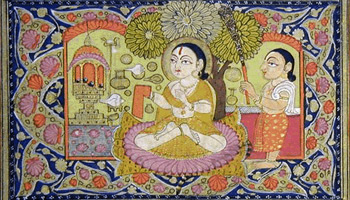
![[ani] yeah, right](https://moon-soup.com/wp-content/uploads/2010/11/ani-yeah-right.gif?w=500&h=282)




 From his article in the NY Times:
From his article in the NY Times:

 maybe not so cute, perhaps grotesque…
maybe not so cute, perhaps grotesque…


 panoramas above- click for full size, okay?
panoramas above- click for full size, okay?














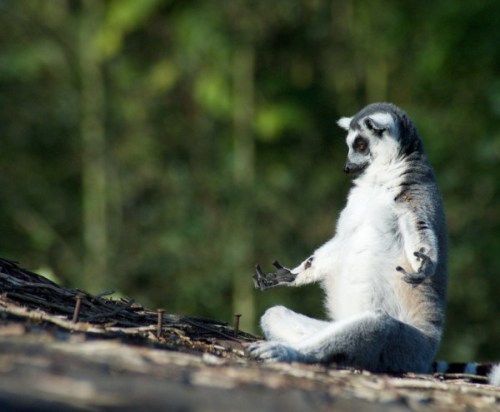

![[big]-zodiacal_beletsky_potw](https://moon-soup.com/wp-content/uploads/2010/11/big-zodiacal_beletsky_potw.jpg?w=500)
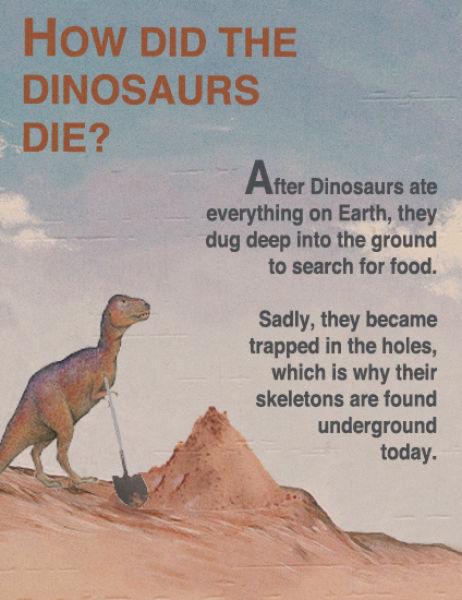

![[skate] haters](https://moon-soup.com/wp-content/uploads/2010/11/skate-haters.gif?w=500)

![[ani] knock knock](https://moon-soup.com/wp-content/uploads/2010/11/ani-knock-knock.gif?w=500&h=366)

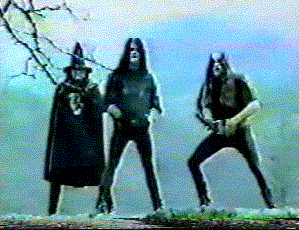
![[k] ZooBabies](https://moon-soup.com/wp-content/uploads/2010/11/k-zoobabies.jpg?w=500)
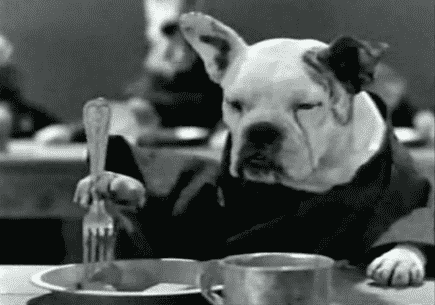

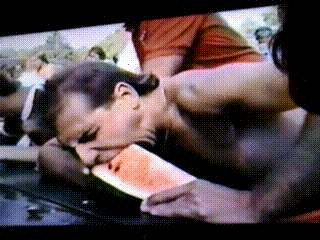
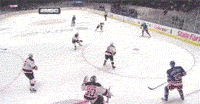






![[ani][elephant] GTFO](https://moon-soup.com/wp-content/uploads/2010/11/anielephant-gtfo.gif?w=500)



![[ani] glau smile](https://moon-soup.com/wp-content/uploads/2010/11/ani-glau-smile.gif?w=500)




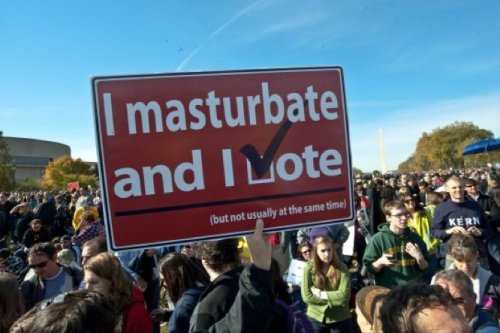
![[m2fm]I don't like your jerk off name](https://moon-soup.com/wp-content/uploads/2010/11/m2fmi-dont-like-your-jerk-off-name.gif?w=500)




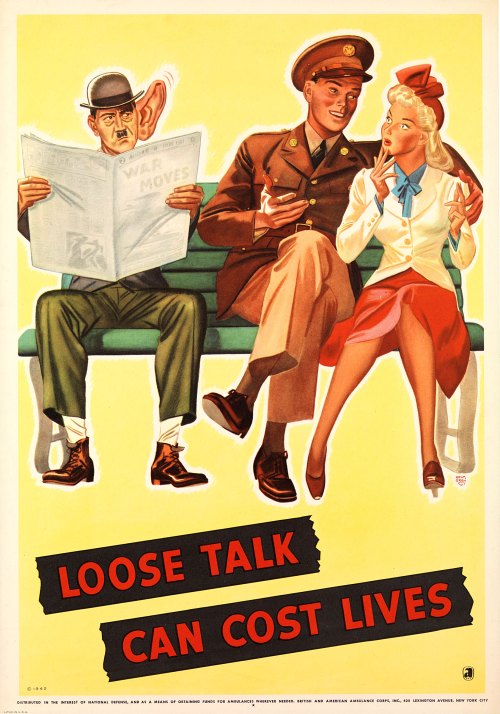


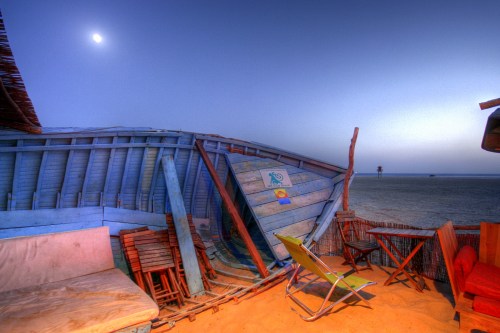


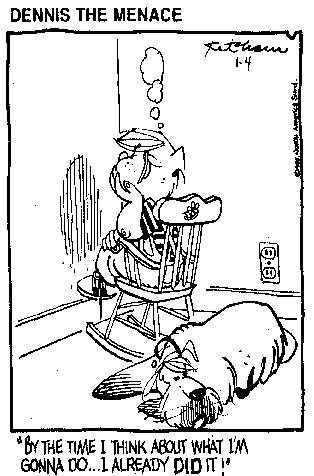




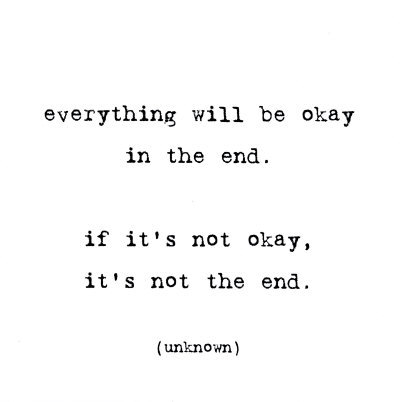















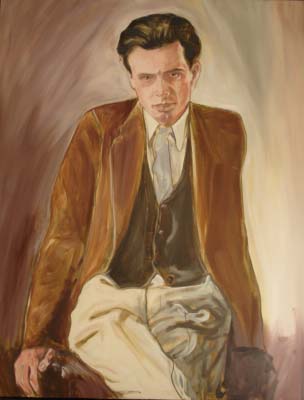
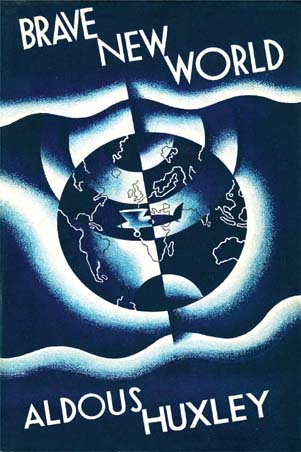

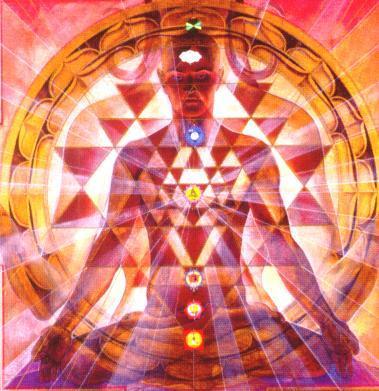

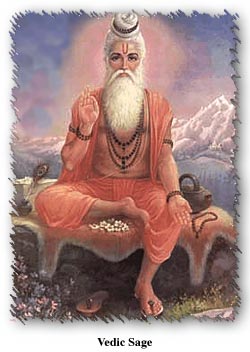














 The Tao Te Ching
The Tao Te Ching